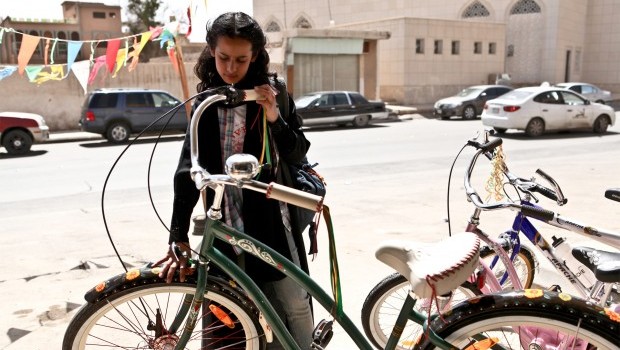
This image released by the Tribeca Film Festival shows a scene from “Wadjda”, a film shot in Saudi Arabia, and the first Saudi film made by a female director. (AP Photo/TriBeca Film Festival)
London, Asharq Al-Awsat—Last year, Lebanese tourism minister Fadi Abboud considered legal action against Showtime over their series Homeland, set partly in Beirut. He told the Associated Press that “it showed Hamra Street with militia roaming in it. This does not reflect reality.”
“It was not filmed in Beirut and does not portray the real image of Beirut,” Abboud said of a scene that had in fact been filmed across the border, in Tel Aviv.
The Middle East is no stranger to the film industry. The region is often depicted through generalizations and stereotypes as an area of perpetual threat, in which terrorism, religious extremism, and oil are the only forces at play.
But just a few miles from the studios of Hollywood, a major film festival is airing some Middle Eastern films, based on and influenced by genuine experiences and real life stories.
The Los Angeles Film Festival began its 19th annual event on Thursday, June 13. Since its inception in 1995, it has become a major cinematic showcase for American and international productions, with awards offered for the latter category. Among the roughly 90,000 people in attendance are some of the most critically acclaimed actors, directors, and producers in the film industry.
This year’s festival will feature nearly 200 films, documentaries, shorts, and music videos. Among the mostly American productions and releases are a handful of Middle Eastern films.
One such title is the only feature-length film ever to be shot entirely in Saudi Arabia, where there are no cinemas, and participation in the film industry is controversial. Wadjda tells the story of an 11-year-old girl from Riyadh who, in an attempt to buy a green bicycle, enters a Quranic recitation competition to win the cash prize of SAR 1,000.
Written and directed by Haifa Al-Mansour, the daughter of Saudi poet Abdul Rahman Mansour, it premiered last year at the Venice Film Festival.
Mansour told reporters at the time that she was “so proud to have shot the first full-length feature ever filmed entirely inside the Kingdom [of Saudi Arabia].” In an interview with Screen, she added, “I feel Saudi is opening up and it is a great opportunity now for people to bring new concepts to the society…. Saudi is going through a very important shift in its history.”
The film was produced by the German production studio Razor, whose titles include Paradise Now and Waltz With Bashir. Wadjda also received backing from Prince Walid bin Talal’s Rotana media organization. It will be shown at the LA Film Festival on Friday, June 21 at 7 p.m., and again the following day at 3.30 p.m.
One film having its North American premiere is a documentary by Iranian–Swedish filmmaker and activist Nahid Persson Sarvestani. Having fled revolutionary Iran, My Stolen Revolution documents Persson Sarvestani’s return to her homeland and her attempts to reunite with the friends she left behind.
The filmmaker has directed several other documentaries with a focus on contemporary Iran. The Queen and I follows both the director and the exiled former queen of Iran, Farah Diba, as they forge an unlikely relationship—given the directors’ communist and anti-monarchist role in the revolution—and discuss their country’s past and present. Prostitution Behind The Veil, a film that tells the story of two prostitutes in Tehran, led Persson Sarvestani to be nominated for an International Emmy award.
The Patience Stone, directed by the French–Afghan writer and filmmaker Atiq Rahimi, tells the story of an Afghan woman whose husband—her “patience stone”—becomes paralyzed after being injured in battle. In his passive state, she tells him about all the things she never did, her frustrations, anxieties, loneliness, dreams, and desires. Attempting to survive in her turbulent and war-torn country, the protagonist seeks refuge with her aunt, a prostitute.
Rahimi left his native Afghanistan after the Soviet invasion, and successfully sought political asylum in France, where he studied and worked until his return to Afghanistan in 2002. Other works include Earth and Ashes, a European and South American bestselling novel that was later developed into an award-winning film.
When I Saw You is a 2012 production directed by Palestinian filmmaker and poet Annemarie Jacir. It was nominated for ‘Best Foreign Language Oscar’ at last year’s Academy Awards.
Set in Jordan in 1967, Jacir tells of a new wave of Palestinian emigrants joining the 1948 generation in the refugee camps. The story follows Tarek, an 11 year old, as he sets out on an adventure and brings the attitudes of the 1960s to the camps.
